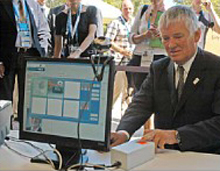
control knowledge / knowledge control
global control / self control
Control and regulation of belonging and exclusion and to a large extent usually voluntary self-optimisation form the context in which social normalisation and subjectification are currently being developed and negotiated. This includes impeded access to knowledge by ongoing university reforms and the contingent economisation of education, the increasing scarcity of financial resources, segregation in everyday urban life, or curtailment of civil rights in the course of anti-terror campaigns along with calls for life-long learning, but also demands for an self-entrepreneurial orientation of one’s own life-project, and body management geared to prevention. At the same time, Europe is being superimposed with a technological border regime of biometric data, “regional codes”, industrial standards, market foreclosure, and “digital divide”.
New technologies/techniques of data collection, processing and distribution play a key role in this respect and are involved in ongoing processes at various levels. Technological developments alone, however, are hardly suitable as an explanatory approach when it comes to analysing the effects of these social transformations on everyday life. At the level of political organisation and new technologies of rule, analyses of power and discipline that hark back to Foucault and recent governmentality studies offer an extremely helpful basis for a critical analysis of prevalent conditions. But characteristically for the model-like nature of social theories from an academic context – particularly for such theories from a Eurocentric perspective – they tend to postulate a hopeless powerlessness in the face of the control system.
They are hardly suitable as instructions for a critical handling of the impositions and paradoxes of everyday life. For cultural production that seeks not only to negotiate in an affirmative manner, but also to critically reflect on and productively transform current conditions, transdisciplinary and transnational perspectives of the phenomenon of control, and interdisciplinary cultural practice are the order of the day. To this end, it is necessary to eliminate the clear detachment of model-based theories from everyday perspectives of action of individual subjects. And these subjects do not only live in the north.
|
| The aim of the workshop, from various subject-oriented perspectives and on the basis of observations and everyday phenomena, is to analyse and discuss our roles, options and strategies of action as cultural producers under current social conditions geared to control and optimisation. In this context, we want to focus on current negotiations and conflicts, exploring spaces of action, incorporating perspectives of the global south, and for once refraining from an overly self-centred fixation on the dispositifs of control and conditioning already imposed on us. |
 September 30 to October 7 / 06
September 30 to October 7 / 06